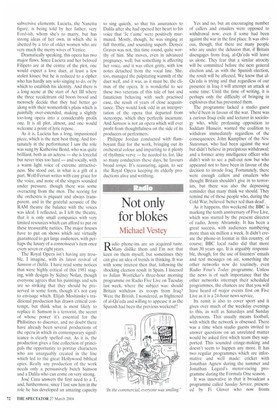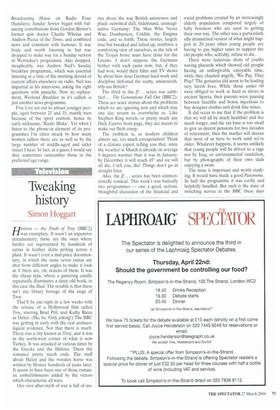Not only for blokes
Michael Vestey
Radio phone-ins are an acquired taste. Many dislike them and I'm not that keen on them myself, but sometimes they can give an idea of trends in thinking. It was with some interest then that, following the shocking election result in Spain, I listened to Julian Worricker's three-hour morning programme on Radio Five Live on Tuesday last week, where the subject was: should Britain withdraw its troops from Iraq? Were the British, I wondered, as frightened of al-Qa'eda and willing to appease it as the Spanish had been the previous weekend?
Yes and no, but an encouraging number of callers and emailers were opposed to withdrawal now, even if some had been against the war in the first place. It was obvious, though, that there are many people who are under the delusion that, if Britain disengages from Iraq, al-Qa'eda will leave us alone. They fear that a similar atrocity will be committed before the next general election and, as with the Spanish election, the result will be affected. We know that alQa'ecla is trying and that regardless of our presence in Iraq it will attempt an attack at some time. Until the time of writing, it is perhaps only the difficulty of bringing in explosives that has prevented them.
The programme lacked a studio guest who'd been in favour of the war. There was a curious Iraqi exile and lecturer in sociology who, while professing opposition to Saddam Hussein, wanted the coalition to withdraw immediately regardless of the consequences; John Kampfner of the New Statesman, who had been against the war but didn't believe in precipitous withdrawal; and a former army intelligence officer who didn't wish to see a pull-out now but who appeared not to have been in favour of the decision to invade Iraq. Fortunately, there were enough callers and emailers who thought Britain shouldn't give in to terrorists, but there was also the depressing reminder that many think we should. They remind me of those people who, during the Cold War, believed 'better red than dead'.
As it happens, this weekend the BBC is marking the tenth anniversary of Five Live, which was started by the present director of radio, Jenny Abramslcy. It has been a great success, with audiences numbering more than six million a week. It didn't create the phone-in format in this country, of course; BBC local radio did that more than 30 years ago. It is arguably responsible, though, for the use of listeners' emails and text messages on air, something the other networks now do routinely, even Radio Four's Today programme. Unless the news is of such importance that the other networks interrupt their scheduled programmes, the chances are that you will have heard of major events first on Five Live as it is a 24-hour news service.
Its remit is also to cover sport and it gives over much of the weekday evenings to this, as well as Saturdays and Sunday afternoons. This usually means football, with which the network is obsessed. There was a time when studio guests invited to answer questions on an unrelated matter would be asked first which team they supported. This sounded cringe-making and doesn't seem to happen any more. It has two regular programmes which are informative and well made: cricket with Jonathan Agnew during the summer and Jonathan Legard's motor-racing programme during the Formula One season.
It was innovative in that it broadcast a programme called Sunday Service, presented by Fi Glover who now fronts Broadcasting House on Radio Four (Sundays). Sunday Service began with balancing contributions from Gordon Brown's former spin doctor Charlie Whelan and Andrew Pierce of the Times, and combined news and comment with humour. It was lively and worth listening to but was dropped to make way for a Sunday version of Worricker's programme. Also dropped, inexplicably, was Andrew Neil's Sunday breakfast programme, which was essential listening at a time of the morning devoid of current affairs elsewhere on radio. Neil was impartial in his interviews, asking the right questions with panache. Now its replacement, Weekend Breakfast as it's called, is just another news programme.
Five Live set out to attract younger people, aged between 25 and 35, mainly men because of the sport content, hence its early nickname, 'Radio Bloke'. Yet when I listen to the phone-in element of its programmes I'm often struck by how many women callers there are as well as by the large number of middle-aged and older voices I hear. In fact, at a guess I would say they sometimes outnumber those in the preferred age range.



























































































 Previous page
Previous page